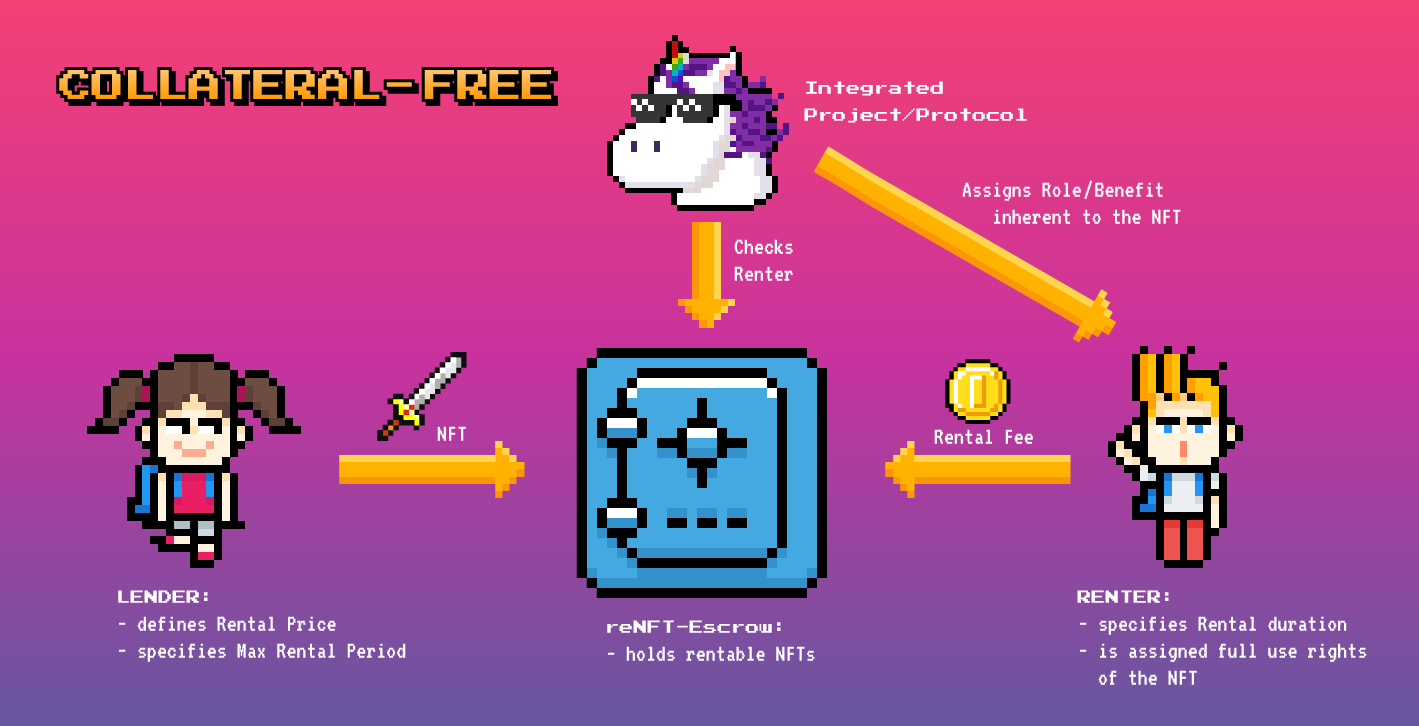Collateral-Free Integration Guide

Lend/Rent NFTs In-App
In order to interact with our smart contract, we'd recommend using our SDK.
The ReNFT object takes in an ethers Signer and an optional contract address if not using the default collateral-free contract.
import { ReNFT } from "@renft/sdk";
const renft = new ReNFT(signer);
Batching
Any of the following functions support batching as shown below for the Lend instruction where the user lends an AstroCat and a CatPlsr in the same function call:
import { BigNumber } from "ethers";
import { NFTStandard, PaymentToken, packPrice } from "@renft/sdk";
const astroCatLendingArgs = [
NFTStandard.E1155,
"0x0db8c099b426677f575d512874d45a767e9acc3c",
BigNumber.from(1),
1,
1,
packPrice(Number(1).toString()),
PaymentToken.WETH,
];
const catPlsrLendingArgs = [
NFTStandard.E1155,
"0x0db8c099b426677f575d512874d45a767e9acc3c",
BigNumber.from(2),
1,
1,
packPrice(Number(0.5).toString()),
PaymentToken.WETH,
];
const lendingArgs = astroCatLendingArgs.map((value, index) => {
return [value, catPlsrLendingArgs[index]];
});
await renft.lend(...lendingArgs);
Lend
import { BigNumber } from "ethers";
import { NFTStandard, PaymentToken, packPrice } from "@renft/sdk";
const nftStandard = NFTStandard.E1155;
const nftAddress = "0x0db8c099b426677f575d512874d45a767e9acc3c";
const tokenID = BigNumber.from(1);
const lendAmount = 1;
const maxRentDuration = 1; // in days
const dailyRentPrice = packPrice(Number(1).toString());
const paymentToken = PaymentToken.WETH;
await renft.lend(
[nftStandard],
[nftAddress],
[tokenID],
[lendAmount],
[maxRentDuration],
[dailyRentPrice],
[paymentToken]
);
Rent
import { BigNumber } from "ethers";
import { NFTStandard } from "@renft/sdk";
const nftStandard = NFTStandard.E1155;
const nftAddress = "0x0db8c099b426677f575d512874d45a767e9acc3c";
const tokenID = BigNumber.from(1);
const lendingID = BigNumber.from(1);
const rentDuration = 1; // in days
const rentAmount = 1;
await renft.rent(
[nftStandard],
[nftAddress],
[tokenID],
[lendingID],
[rentDuration],
[rentAmount]
);
Stop Rent
import { BigNumber } from "ethers";
import { NFTStandard } from "@renft/sdk";
const nftStandard = NFTStandard.E1155;
const nftAddress = "0x0db8c099b426677f575d512874d45a767e9acc3c";
const tokenID = BigNumber.from(1);
const lendingID = BigNumber.from(1);
const rentingID = BigNumber.from(1);
await renft.stopRent(
[nftStandard],
[nftAddress],
[tokenID],
[lendingID],
[rentingID],
);
Claim Rent
import { BigNumber } from "ethers";
import { NFTStandard } from "@renft/sdk";
const nftStandard = NFTStandard.E1155;
const nftAddress = "0x0db8c099b426677f575d512874d45a767e9acc3c";
const tokenID = BigNumber.from(1);
const lendingID = BigNumber.from(1);
const rentingID = BigNumber.from(1);
await renft.claimRent(
[nftStandard],
[nftAddress],
[tokenID],
[lendingID],
[rentingID],
);
Stop Lend
import { BigNumber } from "ethers";
import { NFTStandard } from "@renft/sdk";
const nftStandard = NFTStandard.E1155;
const nftAddress = "0x0db8c099b426677f575d512874d45a767e9acc3c";
const tokenID = BigNumber.from(1);
const lendingID = BigNumber.from(1);
await renft.stopLend(
[nftStandard],
[nftAddress],
[tokenID],
[lendingID],
);
Query Loan/Rental Status
Our current indexing solution is provided by The Graph. Feel free to experiment with our subraph (renft-registy) in the Playground tab.
To query our subgraph, send an HTTP POST request to https://api.studio.thegraph.com/query/3020/renft-registry/1.0.1 whose body is a GraphQL query.
Here are some example queries:
Get 5 lendings after skipping 5 where the NFT's address is: 0x0db8c099b426677f575d512874d45a767e9acc3c sorted by dailyRentPrice in descending order.
{
lendings(where: {nftAddress: "0x0db8c099b426677f575d512874d45a767e9acc3c"}, orderDirection: desc, orderBy: dailyRentPrice, first: 5, skip: 5) {
id,
lenderAddress,
maxRentDuration,
dailyRentPrice,
paymentToken,
lendAmount,
nftAddress,
tokenID,
is721,
lentAt
}
}
Get a lending by id.
{
lending(id: "1") {
id,
lenderAddress,
maxRentDuration,
dailyRentPrice,
paymentToken,
lendAmount,
nftAddress,
tokenID,
is721,
lentAt
}
}
Get rentings for renter 0x4976fb03C32e5B8cfe2b6cCB31c09Ba78EBaBa41 ordered by rentDuration in ascending order
{
rentings(where: {renterAddress: "0x4976fb03C32e5B8cfe2b6cCB31c09Ba78EBaBa41", expired: false}, orderDirection: asc, orderBy: rentDuration) {
id,
renterAddress,
rentDuration,
rentedAt,
rentAmount,
lending {
id,
tokenID,
nftAddress,
dailyRentPrice,
paymentToken,
lenderAddress
},
}
}
Unpacking Data
Prices are returned in a custom format. To unpack them, use our SDK's unpackPrice function:
import { BigNumber } from "ethers";
import { PaymentToken, unpackPrice } from "@renft/sdk";
const parsePaymentToken = (tkn: string): PaymentToken => {
switch (tkn) {
case "0":
return PaymentToken.SENTINEL;
case "1":
return PaymentToken.WETH;
case "2":
return PaymentToken.DAI;
case "3":
return PaymentToken.USDC;
case "4":
return PaymentToken.USDT;
case "5":
return PaymentToken.TUSD;
default:
return PaymentToken.DAI;
}
};
const lendingsDataToLendings = (
theGraphLendings: TheGraphLending[]
): Lending[] => {
const theGraphToLending = (theGraphLending: TheGraphLending): Lending => {
return {
lendingID: BigNumber.from(theGraphLending.id),
lenderAddress: theGraphLending.lenderAddress,
dailyRentPrice: unpackPrice(theGraphLending.dailyRentPrice),
maxRentDuration: Number(theGraphLending.maxRentDuration),
lendAmount: Number(theGraphLending.lendAmount),
paymentToken: parsePaymentToken(theGraphLending.paymentToken),
lentAt: Number(theGraphLending.lentAt),
};
};
return theGraphLendings.map(theGraphToLending);
};